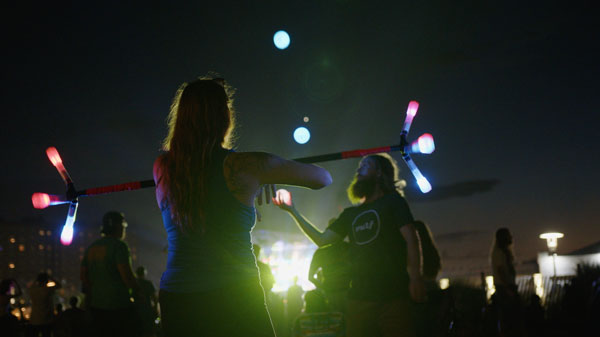
Black Moon tells the story of members of a Mexican community understanding power structures and learning how to use (or not use) their voices. The story centers around a hardworking housekeeper named Mercedes and her siblings, grandfather, and son, who come together after the death of her father. These characters face individual hardships but come to learn the importance of solidarity. Their family does not have a lot of money, but what they lack in income, they make up for in love for each other and Earth.
I was most impressed by the extraordinarily beautiful settings in Black Moon. The characters spend time near magnificent waterfalls, near a tremendous tree house in the woods, on magnificent back roads alongside verdant grass, crossing bridges over broad rivers to get to school, and fishing in rafts on the rivers. The townspeople are connected to and dependent on nature their food, jobs, and locales for leisure time. When the local government decides to build a dam, the community believes that their habitat is being threatened. I had the pleasure of interviewing the film’s writer and director, Tonatiuh García Jiménez, who lives in Xalapa, the capital city of Veracruz, Mexico. He informed me that this film was inspired by a true incident that happened in Veracruz, in which a Brazilian company obtained permission from the government to build dams in a local river, thereby interfering with daily activities of the people.
I was intrigued by the friendship between Muda, a deaf young woman in town, and Mercedes’s flirtatious sister, Camila. When touchy men like Ramiro make advances toward Camila, Muda tries signing to Camila that men like him are no good. Camila refuses to brush these men off, which only makes Muda grow agitated and walk away. Later in the movie, Muda confesses to Camila that she was assaulted by her uncle when she was younger and that she is not actually deaf. She was silent, both literally and figuratively, for so many years because she was afraid people would not believe her. Unfortunately, Camila does not pay much attention to Muda’s warnings.
Meanwhile, Mercedes’s son, Santiago, is teased in school for being a poor reader and for not connecting with other students well. When Santiago goes home, he spends time with his great grandfather, known as “Abuelo” by all the adults in the movie. Abuelo has a special, intuitive connection with nature, which is beautiful to watch. He does not talk, which makes Santiago skeptical. Santiago asks his mother if she too will grow silent when she becomes old. Toward the end of the movie, Abuelo finally confesses to Santiago that he used to drive a train, meaning he benefited from the government’s anti-environmental construction of a railroad track decades ago– the same kind of anti-environmental agenda the government is attempting to execute now to build their dam. This helps Santiago gain a better understanding of, and connection to, Abuelo and to nature.










